


 |  |  | Women professors with children |
| Chair | Pam Cosman, UCSD | |
| Panel | Marc Goulden, Principal Analyst, Graduate Division, | |
| Sangeeta Bhatia, Associate Professor, UCSD Bioengineering | ||
| Pamela Cosman, Professor, UCSD Electrical Engineering | ||
| Melany Hunt, Professor, Caltech, Mechanical Engineering | ||
| Sara Wadia-Fascetti, Associate Professor, Civil and , | ||
| Environmental Engineering Northeastern University | ||
This session was intended to provide some advice, anecdotes, perspectives, and information about combining children with an academic engineering career. Obviously children are of concern to both parents and not just women faculty, but equally obviously the workload is different with childbirth and women historically have borne the brunt of childcare. All but one of the panelists in this session were women, but men participated actively in the discussions.
The first main topic concerns the timing of children- should one have babies during one's graduate student years, during a postdoc, as a faculty member pre-tenure, or should one wait until after tenure? The second main topic concerns strategies for balancing work and family once a baby has arrived.
The session began with a presentation by Dr. Marc Goulden, who presented a wealth of data on pipeline issues in academic careers, including how the timing of children impacts academic careers differently for men and for women. Chapter * details his presentation. Here, we present the personal anecdotes from the other four speakers in the session.
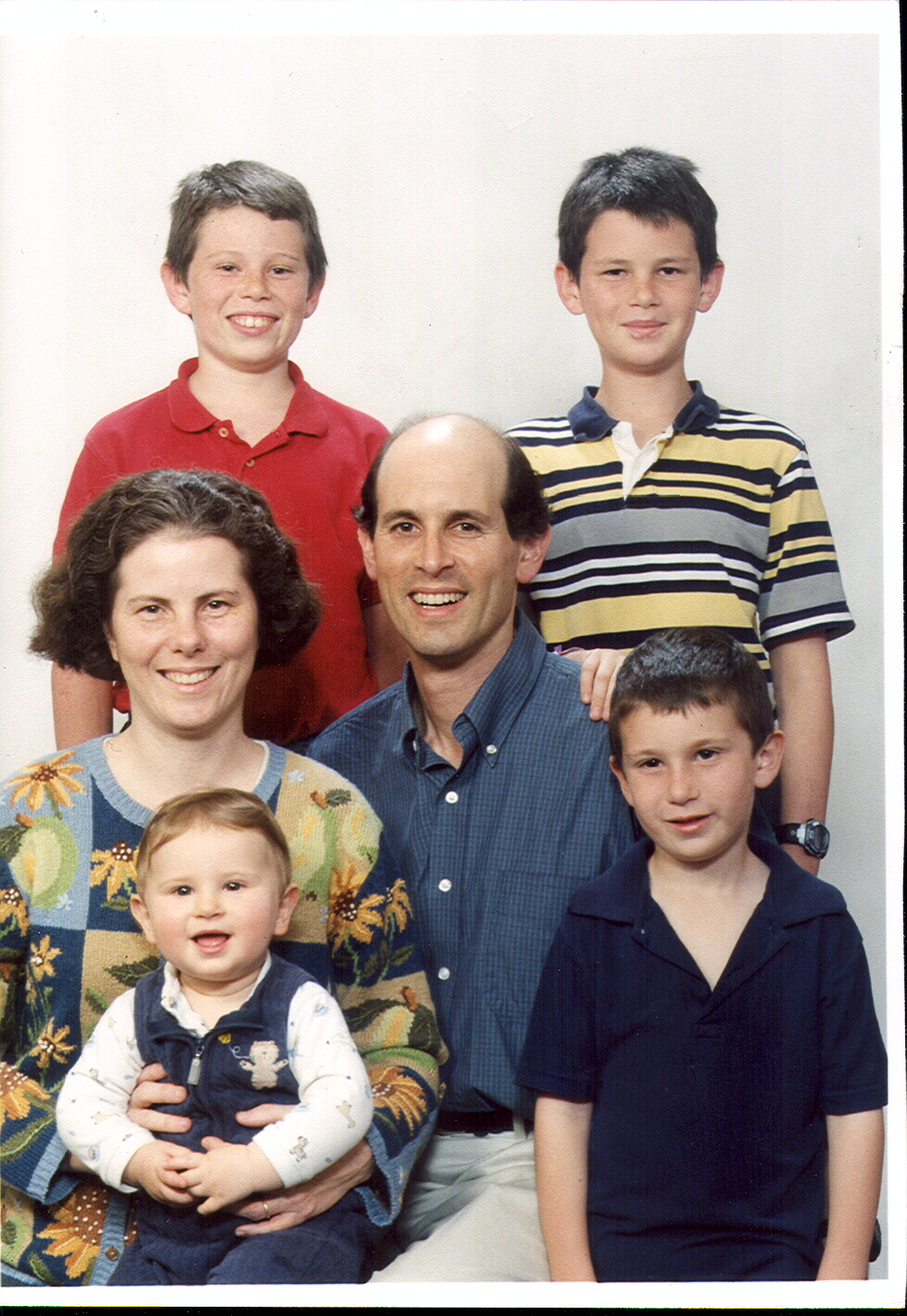
|
Having a baby as a graduate student can be a particularly good time to do it, providing that a few things are true. First, your adviser needs to be the type of person who is understanding of the situation, and needs to allow you some flexibility in your work hours for some months, and should be the sort of adviser who will not be upset about a slight dip in your productivity. Of course, this is the sort of adviser you want to work for in any case, regardless of whether you are planning to have a baby or not. For example, there was a case where a male student took a 5-week summer vacation, which had been approved by his adviser. A week after his return, his mother died, and the student took off an additional 5 weeks to spend with his father and siblings. The student therefore had off 10 weeks with pay, and there was a noticeable dip in productivity in the months that followed. The adviser was understanding of the situation, and allowed the time off with pay, and was not upset about the dip in productivity. So, this sort of adviser is good to have in any case, and not just for pregnant students.
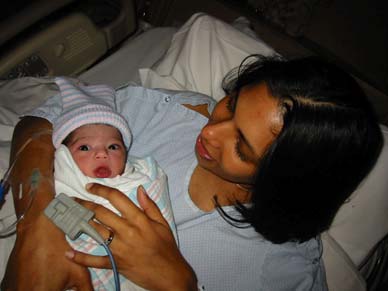
|
Second, it is hard to have a baby while still taking classes. So if a graduate student wants to have a baby, it might be wise to do it after the required courses are finished. The inflexible hours of lectures and exams can be difficult to reconcile with the unpredictable schedule of a newborn. Even after the baby is a few months old, there may be unpredictable terrible nights of sleep intermingled good nights, as well as health issues that crop up, and other unexpected irregular events. This can often fit in well with doing research (assuming the research is not something that must be done on a fixed daily schedule) but is likely to be harder to fit in with taking classes.
Third, the graduate student mother needs to have the financial resources to pay for child care, which often means having a husband who has a real income, as opposed to a graduate student stipend.
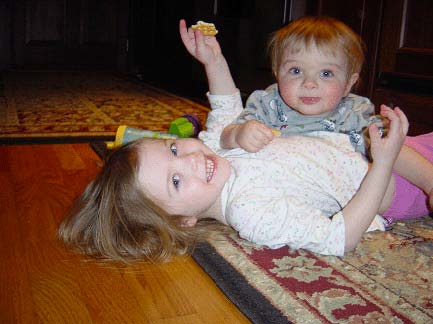 Under these circumstances, having a baby while in grad school can
be the best time to do it! The difficulty or ease of having
a baby as an untenured faculty member depends largely
on the maternity policy of the particular university (see the next
section on policies).
Having a baby post-tenure
can be more stressful than having one
during grad school
(assuming of course that during grad school one had the right
combination of supportive adviser and adequate finances and
so forth) but is less stressful than having one pre-tenure.
Prof. Cosman's third child was born when she was still untenured,
and she had the option of extending the tenure clock by one year.
She did not need the extension of time (in fact, she was offered
tenure early) but she was pleased to know that the option was there.
It was also helpful that the decision to extend or not extend the
tenure clock was not one that had to be made when the baby was born.
It was possible to wait and see how the research turned out over the
next couple of years.
Under these circumstances, having a baby while in grad school can
be the best time to do it! The difficulty or ease of having
a baby as an untenured faculty member depends largely
on the maternity policy of the particular university (see the next
section on policies).
Having a baby post-tenure
can be more stressful than having one
during grad school
(assuming of course that during grad school one had the right
combination of supportive adviser and adequate finances and
so forth) but is less stressful than having one pre-tenure.
Prof. Cosman's third child was born when she was still untenured,
and she had the option of extending the tenure clock by one year.
She did not need the extension of time (in fact, she was offered
tenure early) but she was pleased to know that the option was there.
It was also helpful that the decision to extend or not extend the
tenure clock was not one that had to be made when the baby was born.
It was possible to wait and see how the research turned out over the
next couple of years.
Prof. Bhatia had her daughter after getting tenure. Prof. Wadia-Fascetti also had her two children after she got tenure. For the first one she had a quarter of maternity leave, immediately followed by a quarter of teaching buy-out, immediately followed by summer and a year of planned Sabbatical leave. This was followed by her 2nd child, and therefore another quarter of maternity leave. So this amounted to two full years away from teaching. While it was wonderful to have all that time off, there was some issue of other faculty members being resentful, and it was a little hard to get back into the swing of things. The first quarter back was difficult, but gradually things got better.
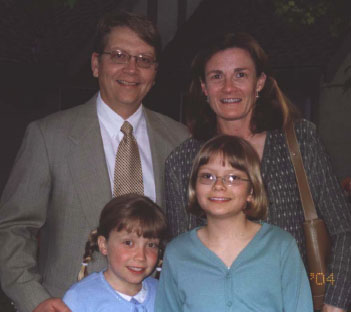
|
In engineering, the first woman faculty member was hired in 1987; Professor Hunt was the second woman, hired in 1988. At that time, Caltech did not have a maternity program for faculty, and surprisingly she was asked her views on this issue during an early interview. In approximately 1990, the first child was born to a Caltech woman faculty member. Professor Hunt's children were born in 1993 and 1996.
One daughter is a pre-tenure baby, and the other is post-tenure. Both children are happy, healthy, loving and confident, without visible scarring from the tenure process. In comparing the experiences, however, it was much easier to have a child in the post-tenure years, then in the pre-tenure period. Dr. Hunt took an extensive sabbatical plus leave with the second child, with little break for the first; she was more confident, relaxed, and comfortable with the second child. However, even knowing that it's tough having a child during the pre-tenure process, a woman should not feel discouraged from having a child during this time. The choice of having a child is an extremely personal decision. If you feel that you're at a point in your life when you want to start or expand your family, you should make that decision without putting undue pressure on yourself about tenure. Prof. Hunt found that most of her colleagues either didn't seem to think about her pre-tenure family decision, or else were supportive of her decision to have a child.
There was some discussion during the session on policies for graduate student maternity leaves. On the one hand, there are disadvantages to leaving the matter up to the kindliness of the adviser.
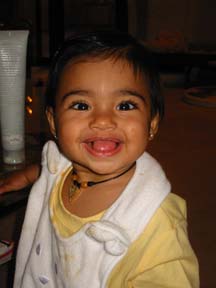
|
At the faculty level, the ease of having a child depends heavily on the maternity policy. As a typical case, one school allowed a one-quarter relief from teaching, as well as a one-year extension on the tenure clock. For many people, the dip in productivity that comes from having a baby does not amount to, say, a reduction by one full year of work over the course of 5 years. So having a baby together with a one-year extension on the tenure clock may actually represent a genuine increase in the hours spent advancing one's case for tenure. A recent change in the policy at the UC schools means that the default position is no longer that the woman faculty member must request the year extension. Rather, the tenure clock will be automatically extended by a year, and the woman faculty member can request that the tenure limit revert back to its original shorter value. This means that the onus is no longer on the woman to request the extension, and the perception has changed of what is the "normal" thing to do.
There was some discussion during the session about a paternity policy. At the UC schools, male faculty as well as female faculty can request the "active service/modified duties" status that can be in the quarter when a child is born or adopted. This means they will get one quarter off from teaching as well. Very few male faculty request this type of paternity leave. It is not known how many male faculty members abuse this policy (for example, by using the quarter off to go to conferences and on a national seminar tour, while their non-university non-working wife takes care of the child) but Dr. Goulden felt the number was quite small.
It was interesting to note the contradictions in perspectives on the work/family balance among the different speakers. There is not one single equation for success in these sorts of situations. What works best for one professor/mother depends on individual factors of personality, family constraints, work constraints and so forth. Here we present an amalgamation of the different points of view and pieces of advice.
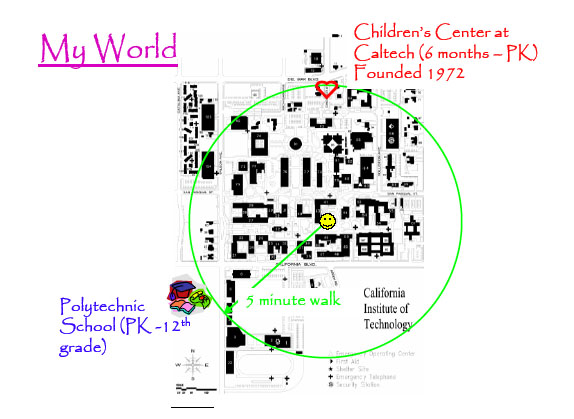
|
Her children now attend Polytechnic School, which is near the southwestern corner of campus. This school was started as the spin-off from the Throop Polytechnic years. It is a private independent school with children from pre-kindergarten through 12th grade. Her children have enjoyed their years at Poly, and she is able to easily run over for the occasional class play, skinned knee, choir performance, student-teacher conference, etc.
Most of the speakers made similar comments about the flexibility of academic life. Academic jobs offer flexibility that you can't find in many other professions. This flexibility is a great asset in child rearing. Certain commitments such as lectures and office hours cannot be switched around freely, but other time during the day is spent doing research, or meeting with individual graduate students, where there is tremendous flexibility in the scheduling. This has the advantage of allowing faculty parents to attend events at their children's school or pre-school relatively easily, more easily than most women in industry would find it.
Prof. Cosman has a nanny/housekeeper who comes in to her home each work day. This has the advantage that the nanny can wash the dishes and do the laundry while the 1-year-old is sleeping. Prof. Cosman feels it is an enormous benefit to have the housework done, so she can devote her home time to being with the children.
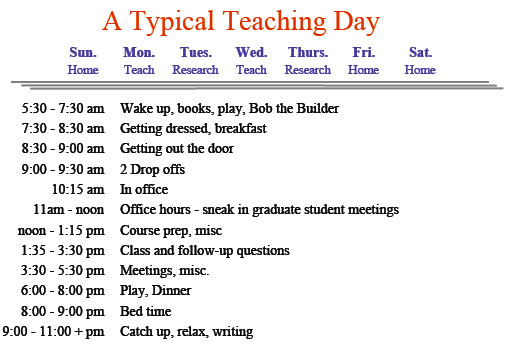

|
Professor Cosman concurred with this sentiment, giving examples such as postponing a car wash (car washes are never needed, because it rains in December) and ignoring the spots in the carpet (carpet spots should be literally beneath one's notice).
In a similar vein, Professor Cosman commented that she issues almost all of her dinner invitations as potluck dinners. While this may not be considered the height of elegance by some, it allows her to enjoy lots of social time with friends and family, without having to leave work early to get the cooking done, or having to stay up to midnight the night before. In any case, guests are going to feel bound to bring something, and better that they should bring something useful instead of a box of chocolates or a bottle of wine.
A number of topics were discussed about work, including re-ordering one's priorities at work after the arrival of a baby, travel, off-loading responsibilities, and planning.
Several speakers commented on the fact that an academic job allows for plenty of family travel. Because the university schedule is well lined up with children's school schedules, most faculty members can take 2-3 weeks of summer travel with the kids, as well as a week during winter break, and various smaller trips at other times.
The rewards of an academic life are many: the job is intellectually

|
From the point of view of having children, the rewards of being a professor and Mom are also numerous. The work week and work day are flexible, so you can go to school performances and sports events and parent-teacher conferences, without having to punch a time clock, and in fact without having to notify anyone that you are leaving, and without having to account for your time to anyone. The children are exposed to all sorts of fascinating intellectual topics from an early age; they learn to appreciate the questions and the approach to answers that a mind devoted to the pursuit of new knowledge produces. Also the children of engineering faculty Moms do not grow up with some of the stereotypical notions of women that other segments of the population may have, e.g., that girls can't do math, and that a woman's place is in the home.
Prof. Cosman said that her boys love math and science, and they consider it a treat when she teaches them some topic in electrical engineering. When the boys talk about sending secret coded messages to their friends at school, they know whereof they speak (ciphers, error control coding, encryption, etc.) Prof. Wadia-Fascetti gave her opinion on academia as "Let it all bounce off because it's the best job in the world and it's worth it!" And Prof. Hunt's youngest daughter wrote a Mother's Day card in which she described the things her Mom does: "Mom works, reads, swims, makes lasagna, drinks Diet Coke, and loves me and my family."
 |  |  | Women professors with children |